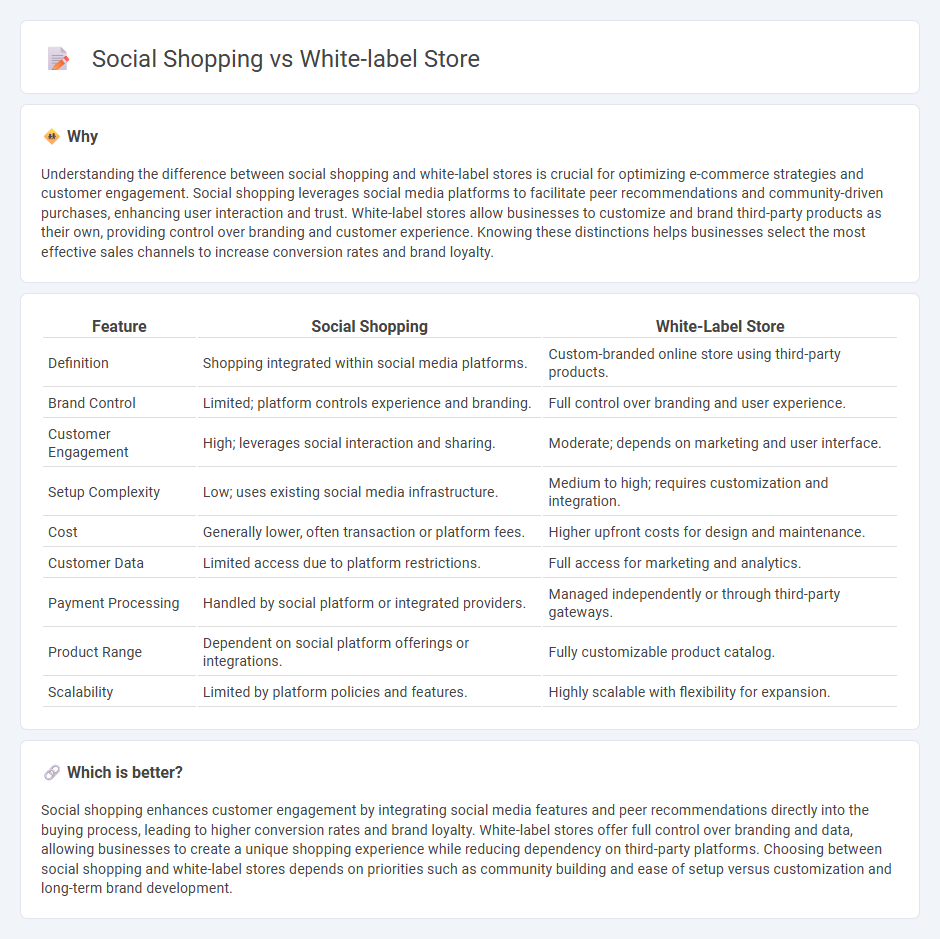
Social shopping harnesses the power of community by integrating social media features and user interactions directly into the purchase process, enhancing customer engagement and trust. White-label stores allow businesses to brand and customize existing e-commerce platforms, providing a seamless, scalable online shopping experience without the need for extensive development resources. Explore how these distinct commerce models can transform your retail strategy and boost sales.
Why it is important
Understanding the difference between social shopping and white-label stores is crucial for optimizing e-commerce strategies and customer engagement. Social shopping leverages social media platforms to facilitate peer recommendations and community-driven purchases, enhancing user interaction and trust. White-label stores allow businesses to customize and brand third-party products as their own, providing control over branding and customer experience. Knowing these distinctions helps businesses select the most effective sales channels to increase conversion rates and brand loyalty.
Comparison Table
| Feature | Social Shopping | White-Label Store |
|---|---|---|
| Definition | Shopping integrated within social media platforms. | Custom-branded online store using third-party products. |
| Brand Control | Limited; platform controls experience and branding. | Full control over branding and user experience. |
| Customer Engagement | High; leverages social interaction and sharing. | Moderate; depends on marketing and user interface. |
| Setup Complexity | Low; uses existing social media infrastructure. | Medium to high; requires customization and integration. |
| Cost | Generally lower, often transaction or platform fees. | Higher upfront costs for design and maintenance. |
| Customer Data | Limited access due to platform restrictions. | Full access for marketing and analytics. |
| Payment Processing | Handled by social platform or integrated providers. | Managed independently or through third-party gateways. |
| Product Range | Dependent on social platform offerings or integrations. | Fully customizable product catalog. |
| Scalability | Limited by platform policies and features. | Highly scalable with flexibility for expansion. |
Which is better?
Social shopping enhances customer engagement by integrating social media features and peer recommendations directly into the buying process, leading to higher conversion rates and brand loyalty. White-label stores offer full control over branding and data, allowing businesses to create a unique shopping experience while reducing dependency on third-party platforms. Choosing between social shopping and white-label stores depends on priorities such as community building and ease of setup versus customization and long-term brand development.
Connection
Social shopping leverages peer recommendations and interactive platforms to enhance customer engagement, driving traffic and sales for white-label stores. White-label stores benefit from social shopping by integrating social features that personalize the shopping experience and expand brand reach without the need for extensive marketing resources. Combining these approaches creates a seamless, community-driven commerce model that boosts conversion rates and customer loyalty.
Key Terms
Branding
White-label stores provide businesses with fully customizable e-commerce platforms, enabling complete brand control and a unique customer experience tailored to brand identity. Social shopping integrates shopping features within social media platforms, leveraging user interaction and community influence but often limiting branding opportunities due to platform constraints. Explore the advantages of each approach to determine which best enhances your brand visibility and customer engagement.
User Engagement
White-label stores offer brands complete control over the shopping experience, driving personalized user engagement through customized interfaces and exclusive product offerings. Social shopping leverages community interaction and peer recommendations to boost engagement by integrating social media features like live streams and user reviews. Explore how each approach enhances customer interaction and loyalty by diving deeper into their unique engagement strategies.
Sales Channel
White-label stores provide businesses with customizable e-commerce platforms that allow full control over branding and customer experience, enhancing direct sales channels. Social shopping integrates social media platforms like Instagram and Facebook to facilitate seamless product discovery and purchases within a community-driven environment, boosting social engagement and impulse buying. Explore the advantages of each sales channel to optimize your online retail strategy effectively.
Source and External Links
The 13 Best White Label Products To Sell in 2025 - Shopify - A white-label store sells products manufactured by one company but branded and sold by another company, often via online stores or marketplaces, allowing entrepreneurs to create their own branded product line without managing production.
White Label MFG - White-label stores can offer custom apparel designed and manufactured through full-service companies that handle everything from concept to delivery, enabling scalable, reliable production under your own brand.
20 Must-Know White Label Dropshipping Suppliers USA [2025] - White-label stores often use dropshipping suppliers that provide branding options like custom packaging and label removal, letting sellers focus on marketing while the supplier handles printing, fulfillment, and shipping.
 dowidth.com
dowidth.com